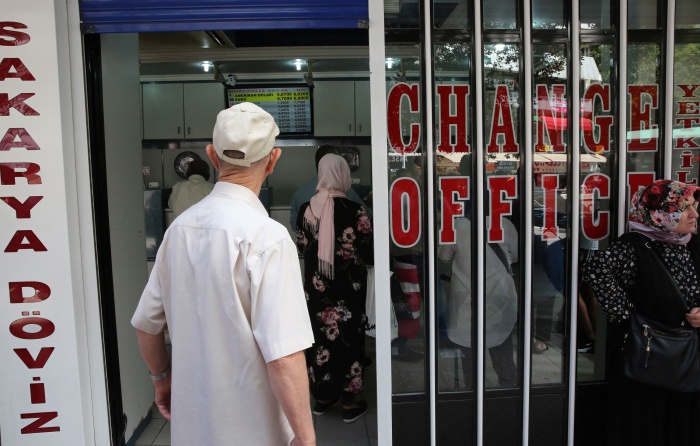Turkey’s lira plunged to 6.30 against the US dollar on Friday as worries about President Tayyip Erdoğan’s influence over monetary policy and worsening US relations snowballed into a market panic that also hit shares of European banks, Reuters reported.
The sell-off has deepened concern about exposure to Turkey, particularly whether over-leveraged companies will be able to pay back loans in euros and dollars after years of overseas borrowing to fund a construction boom under Erdoğan.
Erdoğan’s characteristic defiance in the face of the sell-off has further unnerved investors. The president, who says a shadowy “interest rate lobby” and Western credit ratings agencies are attempting to undermine Turkey’s economy, said in a speech overnight that Turks should “have no worries”.
“If they have their dollars, we have our people, our God,” he told a crowd in the Black Sea city of Rize.
He likened the successive loss in value of the lira to a coup attempt on July 15, 2016, saying, “We won’t lose the economic battle,” after Friday prayer in Bayburt province, according to the Cumhuriyet daily.
That is unlikely to mollify investors who are also worried by a growing dispute with the United States. The NATO allies are at odds over the detention in Turkey of US evangelical pastor Andrew Brunson on terrorism charges.
Those tensions with Washington have compounded concerns about Turkey’s authoritarian trajectory under Erdoğan.
“The basic reason the exchange rate has gone off the rails is that confidence in the management of the economy has disappeared both domestically and abroad,” said Seyfettin Gürsel, a prominent economist and a professor at Turkey’s Bahçeşehir University.
“First of all, confidence needs to be regained. It is obvious how it will be done: Since the final decision-maker of all policies in the new regime is the president, the responsibility of regaining confidence is on his shoulders.”
The lira was at 5.97 against the dollar at 0842, GMT, down some 7 percent. It had fallen as much as 14.6 percent — its biggest one-day drop since early 2001 — before paring some losses. Shares of European lenders also dropped, hit by concern about their Turkey exposure.
The lira hit 6.30 against the dollar late Friday.
The currency has fallen more than 35 percent this year after losing nearly a quarter of its value in 2017.
“The situation of Turkey cannot go on for much longer — I think they will have to intervene,” Cristian Maggio, head of emerging markets strategy at TD Securities, adding that the intervention needed to be “drastic.”
“Turkey is playing a very dangerous game. They keep lagging behind the curve, and the pace of the depreciation and the penalty that the market inflicts on Turkey when it sells off is increasing at a more than linear pace, almost exponentially.”
Erdoğan, a self-described “enemy of interest rates,” wants cheap credit from banks to fuel growth, but investors fear the economy is overheating and could be set for a hard landing. His comments on interest rates — and his recent appointment of his son-in-law as finance minister — have heightened perceptions that the central bank is not independent.
The central bank raised interest rates to support the lira in an emergency move in May, but it did not tighten at its last meeting.
Finance and Treasury Minister Berat Albayrak — Erdogan’s son-in-law, appointed last month — was due to announce the government’s latest plan for the economy at a press conference at 9:30 a.m. local time; however, he postponed the meeting twice during the day.
While Turkey and the United States disagree over a host of issues, the most pressing disagreement has been over Brunson and the detention of other US citizens in Turkey. A delegation of Turkish officials held talks with their counterparts in Washington this week, but there is no sign of a breakthrough.
While there was no statement from the Turkish side, US State Department spokesperson Heather Nauert said wide-ranging conversations had been held.
“I would say we would define progress as Pastor Brunson being brought home,” Nauert said.

